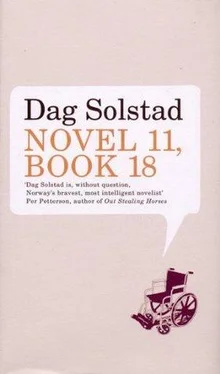And what did Dr Schiøtz say to all of this? Not much. He was simply elated. He did his investigations, sealed the tests, sent them for analysis, received the results, summoned Bjørn Hansen to another appointment and did new tests. Meanwhile Bjørn Hansen continued to talk about matters of this kind. It was as if he had entered an altogether different space simply by walking towards Dr Schiøtz, sitting or standing and with his mild, absent gaze, which occasionally fluttered with a quiet joy that someone had come to him in this way. Now and then he would refer to his drug addiction, always by calling it his ‘fate’. ‘With my fate,’ he might say, ‘it’s not so easy to relate to anything at all, even the most quotidian task is a torture to me when I think about it. Oddly enough, not when I do it, but when I think about it, before or after.’ At long last Dr Schiøtz had undertaken a complete check-up of Bjørn Hansen’s body and had found nothing whatsoever. ‘There’s nothing wrong with you,’ he said, ‘that I can guarantee,’ and then he snickered. It was a bad habit that the doctor had developed in his consultations with Bjørn Hansen. A suppressed snicker, which Bjørn Hansen disliked, but accepted because it meant that Dr Schiøtz now trusted him so implicitly that he could let out this expression of being caught up in a permanent mild intoxication, which he otherwise had to take great care not to let slip from his innermost being, where he lived his own life, only for himself, in himself, totally indifferent to anything except the intoxication that was wreaking havoc so soothingly in his invisible veins. And with that Bjørn Hansen’s role as patient was over. He said thank you and goodbye and left the hospital, a bit surprised that it was over and that these strange sessions were now a closed chapter.
But then Dr Schiøtz began to seek out Bjørn Hansen privately. In his flat. Mostly late at night, and often more intoxicated than he used to be in his office. He did not come often, maybe once a week, sometimes more seldom. But the conversations continued. Bjørn Hansen talked and Dr Schiøtz alluded to his fate, which he was glad to be able to give voice to in a natural and straightforward manner. When Dr Schiøtz had left, Bjørn Hansen continued the conversation by himself, with the doctor as a fictitious interlocutor. In this way he became increasingly absorbed by thinking openly in the language that had somehow taken hold of him. It was all about his inability to reconcile himself to the fact that this was it. He felt outraged. He refused to put up with it. Somehow or other he had to show it, that he refused to put up with it. And so he hatched a plan. An insane project, which he decided to present to Dr Schiøtz the next time he called.
It was a plan whereby Bjørn Hansen would actualise his No, his great Negation, as he had begun to call it, through an action that would be irrevocable. Through a single act he would plunge into something from which there was no possibility of retreat and which bound him to this one insane idea for the rest of his life. He very much looked forward to presenting it to Dr Schiøtz, not least because the plan depended on the doctor’s cooperation, so that it bound them together in a way that completed the relationship which had by now sprung up between them. He therefore looked forward to Dr Schiøtz’s coming, and when he finally rang the doorbell late one evening, more remote than ever, in another world, one could safely say, Bjørn Hansen heard a peculiarly expectant tone in his own voice when he said, ‘Ah, it’s you, come in, come in!’ Dr Schiøtz sat down and straightaway Bjørn Hansen began to explain his plan, in brief outline. What it consisted of, what Bjørn Hansen was going to do, and why, and where Dr Schiøtz came into it. However, Dr Schiøtz said at once that he would not take part in it. It was too risky. But Dr Schiøtz was completely necessary, without him it could not be implemented. Bjørn Hansen was astonished by the doctor’s negative reaction, which suggested that he looked at it as ‘reality’ and not as an ‘idea’, the way it was intended on Bjørn Hansen’s part; but if an ‘idea’ is to be carried to its logical conclusion as an ‘idea’, it must be trumpeted as ‘reality’, something that Dr Schiøtz had not been willing to accept. Maybe the ‘idea’ was no good, Bjørn Hansen thought, trying to explain it further to the doctor. He did not feel he got it quite right. He vouched fully for the ‘idea’, or vision, but had difficulty putting it into words. Not what was going to happen, but why in the world he could take it into his head to think like that, even if only as a game. In the end he simply had to tell him: ‘I cannot explain why I think as I do,’ he said. ‘But that’s how I’m thinking, all right,’ he added, laughing, slightly confused at himself. Shortly afterwards Dr Schiøtz said ‘Good night’ and left.
But he came back. He had changed his mind. ‘But I want half of the insurance money,’ he said, something Bjørn Hansen was glad to offer him. ‘For you’re taking a great risk,’ he said. Dr Schiøtz gave a shrug.
From then on the doctor tackled the plan. With his expertise, he at once pounced on three weak elements in it. ‘The place in question cannot be here,’ he said. ‘It must be somewhere else altogether. In Eastern Europe, maybe. Do you have any opportunity of going there for a plausible reason?’ Bjørn Hansen thought it over. ‘Yes,’ he said, ‘I think so.’ And then there was one thing that had to be prevented. No one else must get involved. If they could see to that, things would work out. ‘Those who will come to grips with the problem as part of their everyday routine won’t have the least suspicion, that’s human nature,’ the doctor said. ‘We won’t be found out, unless you crack up.’ But Bjørn Hansen would not crack up. If for nothing else than out of consideration for Dr Schiøtz. If he should feel an urge to confess, he had someone other than himself to consider, and that would seal his lips, he said passionately, and again he noticed that Dr Schiøtz was touched.
After the insane ‘idea’ had been gone over in meticulous detail by Dr Schiøtz, it took on the nature of a clinical operation, in which one dealt with points of surgery, whose alternatives and possible obstacles were carefully reviewed. For now that Dr Schiøtz had decided to participate actively in the game, he made it very concrete. What from the beginning had been merely an expression of Bjørn Hansen’s profound yearning for something irrevocable, now became a feasible project within the structure of the health service, where one had to take advantage of the fact that it is possible to make, from the inside, little holes, thin and dark, in every conceptual system, as well as in every social network.
For Bjørn Hansen, Dr Schiøtz’s espousal of his project meant that it became both more uncanny and more fascinating. Soon he could not tell whether it was a game or real. Well, he was himself of the opinion that it was a game, a sick figment of his imagination — oh yes, that’s what he called it, this logic of lunacy in his own brain which he was so fascinated by and which he shared with Dr Schiøtz, like a vote of confidence. But as one word led to another and he pointed out to Dr Schiøtz that it was a ‘game’, even insisting on it, though very discreetly, indirectly, Dr Schiøtz looked scornfully at him, as if he wouldn’t budge, failing to understand what Bjørn Hansen meant by referring to a sort of ‘game’. The plan was to be carried out. That was entirely real. They merely lacked a locale, and that would present itself in due course. Dr Schiøtz was not playing a game. Bjørn Hansen felt a tightening in his throat. Wasn’t he the treasurer at Kongsberg? Wasn’t Dr Schiøtz a highly respected doctor at Kongsberg Hospital? What was this anyway? A game that, even as a game, must never reach anyone’s ears, the embarrassment would be too great. The treasurer and the doctor. But Dr Schiøtz was a drug addict. He needed a fellow conspirator, and not only to play a ‘game’. He had taken a personal risk to track down a ‘healthy’ person who spoke the language of the ‘sick’, in earnest, as a fellow conspirator; Dr Schiøtz did not hesitate to enter into a business agreement with such a brother.
Читать дальше












